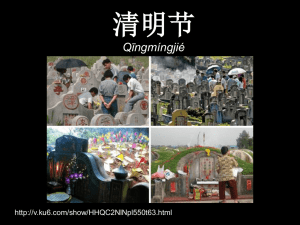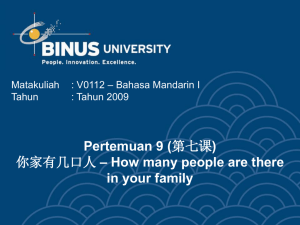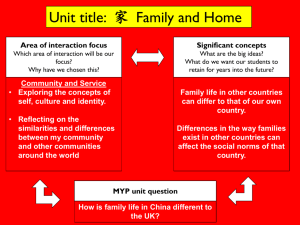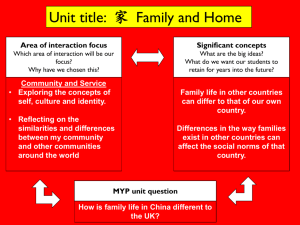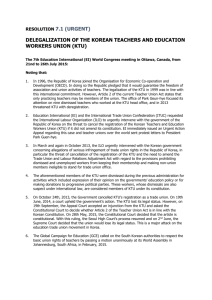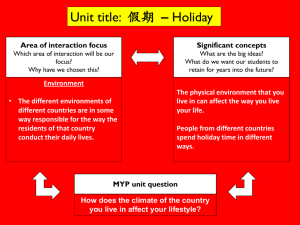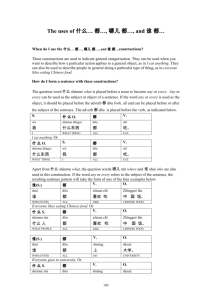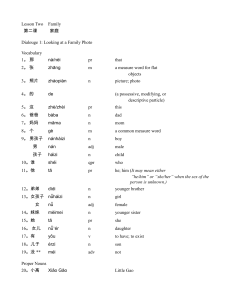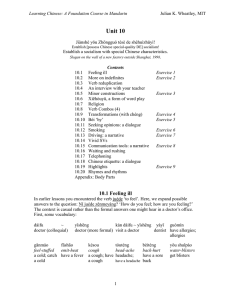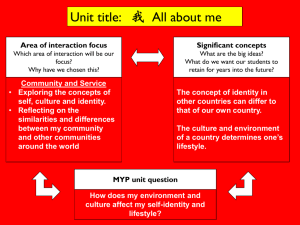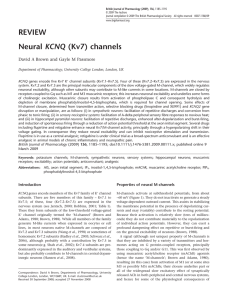Chapter 4 Dialogue 2
advertisement
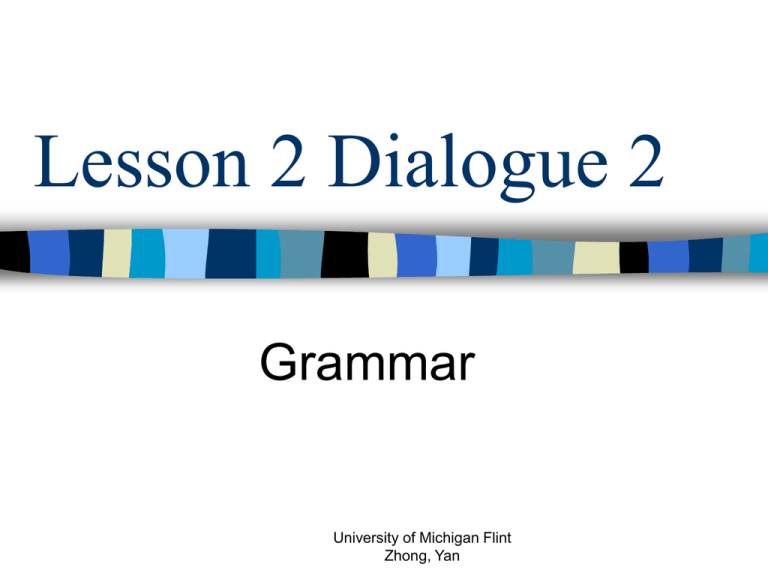
Lesson 2 Dialogue 2 Grammar University of Michigan Flint Zhong, Yan 家 (jiā) In Chinese, 家 (jiā) can refer to one’s family as well as one’s home. So one can point to his or her family picture and say“我家有四口人”(Wǒ jiā yǒu sì kǒu rén; There are four people in my family) one can also point to his or her house and say“这是我家”(Zhè shì wǒ jiā; This is my home). 有 (yǒu) in the Sense of “to Exist” 我家有五个人。 Wǒ jiā yǒu wǔ ge rén. There are five people in my family. There are two college students in Little Gao’s family. 小高家有两个大学生。 Xiǎo Gāo jiā yǒu liǎng ge dàxuéshēng. 口 (kǒu) is the idiomatic measure word in northern China for the number of family members. In the south, people say 个 (gè /ge) instead. The numeral 一 (yī, one) The numeral 一 (yī, one) is pronounced in the first tone (yī) when it stands alone or comes at the end of a phrase or sentence. Otherwise, its pronunciation changes according to the following rules: (a) Before a fourth-tone syllable, it becomes second tone: 一个 (yí gè). (b) Before a first-, second- or third-tone syllable, it is pronounced in the fourth tone 一张 (yì zhāng, a sheet), 一盘 (yì pán, one plate), 一本 (yì běn, one volume). The Usage of 二 (èr) and 两(liǎng) 二 (èr) and 两 (liǎng) both mean “two,” but they differ in usage. In compound numerals, 二 (èr) is always used for the 2 on the last two digits 22 二十二 èrshí’èr 125 一百二十五 yìbǎi èrshí’wǔ Unlike and, 和 (hé) cannot link two clauses or two sentences: My father is a teacher , and my mother is a physician. 我爸爸是老师,*和我妈妈是医生 Wǒ bàba shì lǎoshī, *hé wǒ māma shì yīsheng. Unlike and, 和 (hé) cannot link two clauses or two sentences: My father is a teacher , and my mother is a physician. 我爸爸是老师,*和我妈妈是医 生 Wǒ bàba shì lǎoshī, *hé wǒ māma shì yīsheng. The Adverb 都 (dōu, both; all) The word 都 (dōu) indicates inclusiveness. As it always occurs in front of a verb, it is classified as an adverb. However, because it refers to something that has been mentioned earlier in the sentence, or in a preceding sentence, it also has a pronoun-like flavor and it must be used at the end of an enumeration. 王朋、李友和高文中都是学生。 Wáng Péng, Lǐ Yǒu hé Gāo Wénzhōng dōu shì xuésheng. Wang Peng, Li You, and Gao Wenzhong are all students. lit. Wang Peng, Li You, and Gao Wenzhong all are students. 都 (dōu) refers back to Wang Peng, Li You and Gao Wenzhong and therefore appears after they are mentioned. 王朋和李友都不是律师。 Wáng Péng hé Lǐ Yǒu dōu bú shì lǜshī. Neither Wang Peng nor Li You is a lawyer. Both Wang Peng and Bai Ying’ai have younger sisters. (lit. Wang Peng and Bai Ying’ai both have younger sisters.) 王朋和白英爱都有妹妹。 Wáng Péng hé Bái Yīng’ài dōu yǒu mèimei. Neither Gao Wenzhong nor Li You has any younger brothers. 高文中和李友都没有弟弟。 Gāo Wénzhōng hé Lǐ Yǒu dōu méi yǒu dìdi. The pause mark, or series comma, 、 is often used to link two, three or even more parallel words or phrases 爸爸、妈妈、两个妹妹和我 bàba, māma, liǎng ge mèimei hé wǒ dad, mom, two younger sisters and I “not all of ... have”: 不都有 (bù dōu yǒu) None of them are Chinese. 他们都不是中国人。 Tāmen dōu bú shì Zhōngguó rén. Not all of them are Chinese. (他们: tāmen, they) 他们不都是中国人。 Tāmen bù dōu shì Zhōngguó rén. None of them have any younger brothers. 他们都没有弟弟。 Tāmen dōu méi yǒu dìdi. Not all of them have younger brothers. 他们不都有弟弟。 Tāmen bù dōu yǒu dìdi. 谢谢 再见 University of Michigan Flint Zhong, Yan
